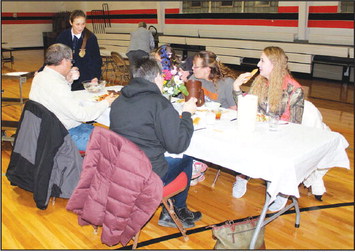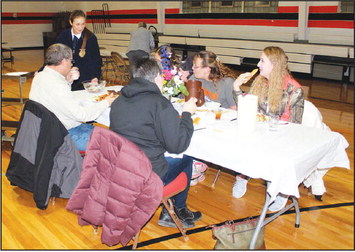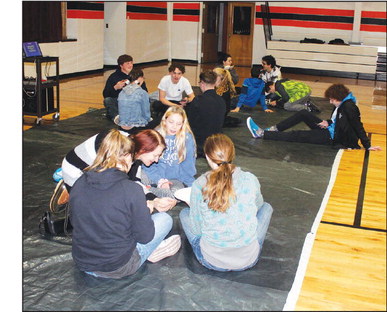The problems of poverty


Granton FFA stages meal event to show differences between ‘haves’ and have-nots’
What does poverty look like? Is it only a problem for people living in third world countries or does it occur closer to home? What are the struggles people in poverty face? These were a few of the questions attendees learned the answers to at a recent poverty meal hosted by the Granton FFA.
The Feb. 27 poverty meal was the first of its kind ever put on by the Granton chapter. At the event, approximately 40 guests had the chance to experience and see how life differs from the upper, middle and lower classes of society through a simple meal. Through the luck of a draw, individuals were divided into the three different classes and first served a meal reflective of the class they were put in, before everyone was given the chance to eat a good meal at the end of the event.
For the upper class, guests were seated upon their entry at decorated tables with cushioned chairs, pitchers full of water and milk and porcelain plates and silverware. They were then served by members of the Granton FFA at their seats with a full course meal of spaghetti and meatballs, breadsticks, salad and dessert bars.
Though the people seated in the middle class received the same meal as those in the upper class, there were no fancy frills to go with it. Seated on lunch tables with a simple plastic tablecloth, the middle class had to travel to the school’s cafeteria to get their food, which was limited in portion size and served with styrofoam plates and plastic forks and knives.
The biggest difference in classes, however, was the one experienced by those in the poverty level at the meal. In this class, members were seated crosslegged on a tarp covering part of the gymnasium floor and given one plateful of white rice to share between three or
CHEYENNE THOMAS/STAFF PHOTO four people. Not provided utensils, the people in this class did their best to eat the meal using their hands and mouths.
Inspiration for the poverty meal came from a much larger version of the event held annually during the Washington Leadership Conference in Washington D.C. In the past year, Granton FFA offi cers Hannah Walter, Rhiannon Reimer and Jaden Gardner all participated in the event at the conference, opening their eyes to the experiences of the poor.
“Through the FFA, the vice presidents participates in the WLC conference in Washington D.C.,” said Walter. “It was completely amazing. Not everyone gets a chance to go, but going down there has made me better aware of poverty.”
“We took home this poverty meal,” added Reimer. “It made me cry.”
The officers began planning their own version of the Conference’s poverty meal a few months after attending the event, setting down the groundwork for the event during their officer’s retreat back in August of last year. When the date drew closer, they said more work was put into the project to make sure everything was in place.
“We wanted to show how poverty in Clark County is compared to the world and U.S.,” said Walter.
“We had meetings before school to make sure we had everything,” added Reimer. “Sometimes we would come in at 4:30 to make sure everything was ready.”
Besides preparing for the meal, the offi cers also prepared some statistics and a video about poverty levels in Clark County, Wisconsin, the United States and the world that they shared with the guests at the meal. The presentation also included information about the cycle of poverty and how it affects generations of growth.
“It happens to us, it happens in Africa, it happens in Wisconsin,” said Gardner during the presentation.
For the officers involved with bringing the poverty meal experience to Granton, they said it was a success. Getting the opportunity to spread awareness about poverty and how it affects individuals, they said will better help the people of the area understand that poverty isn’t just some problem for someone far away.
“It’s definitely eye opening,” said Walter “You would not expect this to happen in a tight knit community. It makes you want to do a little more to help.”
In thinking of ways to help the poor, the officers said even just being aware of one’s own wasteful habits goes a long way. In the coming months, the officers said they hope to further educate other students at the Granton School District about the simple things they can do to reduce their waste and conserve items for when they are really needed.
“Even things like smaller servings (can help),” said Reimer. “At lunchtime, the garbage can is always full of uneaten food. Don’t take this if you’re just going to waste it.”
CHEYENNE THOMAS/STAFF PHOTO


